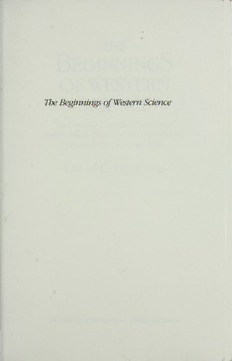
The Beginnings of Western Science: The European Scientific Tradition in Philosophical, Religious, and Institutional Context, Prehistory to A.D. 1450 PDF
Preview The Beginnings of Western Science: The European Scientific Tradition in Philosophical, Religious, and Institutional Context, Prehistory to A.D. 1450
The Beginnings ofWestern Science THE Beginnings of western SCIENCE The European Scientific Tradition in Philosophical, Religious, and Institutional Context, 600 b.c. to a.d. 1450 David Lindberg C. The University ofChicago Press I Chicago andLondon TheUniversityofChicagoPress,Chicago60637 TheUniversityofChicago Press,Ltd.,London © 1992 byTheUniversityofChicago All rightsreserved. Published 1992 Printed in the United States ofAmerica 07 06 05 04 03 02 01 00 99 98 6 7 8 9 ISBN(cloth):0-226-48230-8 ISBN(paper):0-226-48231-6 LibraryofCongressCataloging-in-PublicationData Lindberg,DavidC. ThebeginningsofWesternscience:theEuropeanscientific tradition in philosophical, religious,and institutionalcontext, 600B.C. toAD. 1450/DavidC.Lindberg. p. cm. Includesbibliographical referencesandindex. — — 1. Science,Ancient History. 2: Science,Medieval History. I. Title. Q124.95L55 1992 509.4—dc20 91-37741 0The paper used in this publication meets the minimum requirements ofthe American — National Standard for Information Sciences Permanence ofPaper for Printed Library Materials, ANSI Z39.48-1992. To Marshall Clagett and Edward Grant who set an example r Contents List ofIllustrations xi Preface xv Science and Its Origins 1 What Is Science? 1 Prehistoric Attitudes toward Nature 4 Babylonian and Egyptian Science 13 The Greeks and the Cosmos 21 TheWorld ofHomer and Hesiod 21 The First Greek Philosophers 25 The Milesians and the Question ofUltimate Reality 27 The Problem ofChange 32 The Problem ofKnowledge 34 Plato's World ofForms 35 Plato's Cosmology 39 TheAchievement ofEarly Greek Philosophy 44 Aristotle's Philosophy ofNature 46 Life and Works 46 Metaphysics and Epistemology 48 Nature and Change 51 Cosmology 54 Motion, Terrestrial and Celestial 58 Aristotle as a Biologist 62 Aristotle's Achievement 67 Hellenistic Natural Philosophy 69 Schools and Education 69 The Lyceum afterAristotle 74 Epicureans and Stoics 77 The Mathematical Sciences in Antiquity 85 The Application ofMathematics to Nature 85 Greek Mathematics 86 Early Greek Astronomy 89 1 viii Contents Cosmological Developments 97 Hellenistic PlanetaryAstronomy 98 The Science ofOptics 105 The Science ofWeights 108 6 Greek and Roman Medicine 111 Early Greek Medicine 111 Hippocratic Medicine 113 Hellenistic Anatomy and Physiology 119 Hellenistic Medical Sects 122 Galen and the Culmination ofHellenistic Medicine 125 7 Roman and Early Medieval Science 135 Greeks and Romans 135 Popularizers and Encyclopedists 137 Translations 147 The Role ofChristianity- 149 Roman and Early Medieval Education 151 Two Early Medieval Natural Philosophers 158 8 Science in Islam 161 Learning and Science in Byzantium 161 The Eastward Diffusion ofGreek Science 163 The Birth, Expansion, and Hellenization ofIslam 166 Translation ofGreek Science intoArabic 168 The Islamic Response to Greek Science 170 The Islamic Scientific Achievement 175 The Decline ofIslamic Science 180 9 The Revival ofLearning in theWest 183 The Middle Ages 183 Carolingian Reforms 184 The Schools ofthe Eleventh and Twelfth Centuries 190 Natural Philosophy in the Twelfth-Century Schools 19" The Translation Movement 203 The Rise ofUniversities 206 10 The Recovery andAssimilation ofGreek and Islamic Science 215 The New Learning 215 Aristotle in the University Curriculum 216 Points ofConflict 218 Resolution: Science as Handmaiden 223 Radical Aristotelianism and the Condemnations of 1270 and 1277 234 The Relations ofPhilosophy and Theology after 1277 240 1 The Medieval Cosmos 245 The Structure ofthe Cosmos 245 Contents ix The Heavens 248 The Terrestrial Region 252 The Greek and Islamic Background to Western Astronomy 261 Astronomy in the West 267 Astrology 274 12 The Physics ofthe Sublunar Region 281 Matter, Form, and Substance 282 Combination and Mixture 285 Alchemy 287 Change and Motion 290 The Nature ofMotion 292 The Mathematical Description ofMotion 294 The Dynamics ofLocal Motion 301 The Quantification ofDynamics 304 The Science ofOptics 307 13 Medieval Medicine and Natural History 317 The Medical Tradition ofthe EarlyMiddleAges 317 The Transformation ofWestern Medicine 325 Medical Practitioners 327 Medicine in the Universities 329 Disease, Diagnosis, Prognosis, and Therapy 332 Anatomy and Surgery 339 Development ofthe Hospital 345 Natural History 348 14 The Legacy ofAncient and Medieval Science 355 The Continuity Debate 355 The Medieval Scientific Achievement 360 Notes 369 Bibliography 407 Index 441 Illustrations MAPS 1 The Greekworld about 450 b.c. 28 2 Alexander the Great's Empire 70 3 The Roman Empire 134 4 Islamic expansion 167 5 Carolingian Empire about 814 186 6 Medieval universities 207 FIGURES 1.1. Babylonian clay tablet 15 1.2. Egyptian medical papyrus 19 2.1. Statue ofZeus 22 2.2. Shrine at Delphi 24 2.3. Ruins ofancient Ephesus 30 2.4. Plato 36 2.5. The five Platonic solids 41 2.6. The celestial sphere according to Plato 43 3.1. Aristotle 48 3.2. Square ofopposition ofthe elements 55 33. TheAristotelian cosmos 57 4.1. Parthenon 72 4.2. The schools ofHellenisticAthens 72 4.3. Epicurus 78 5.1. Incommensurability ofthe side and diagonal ofa square 87 5.2. The method of"exhaustion" 88 5.3. Two-sphere model ofthe cosmos c)()
